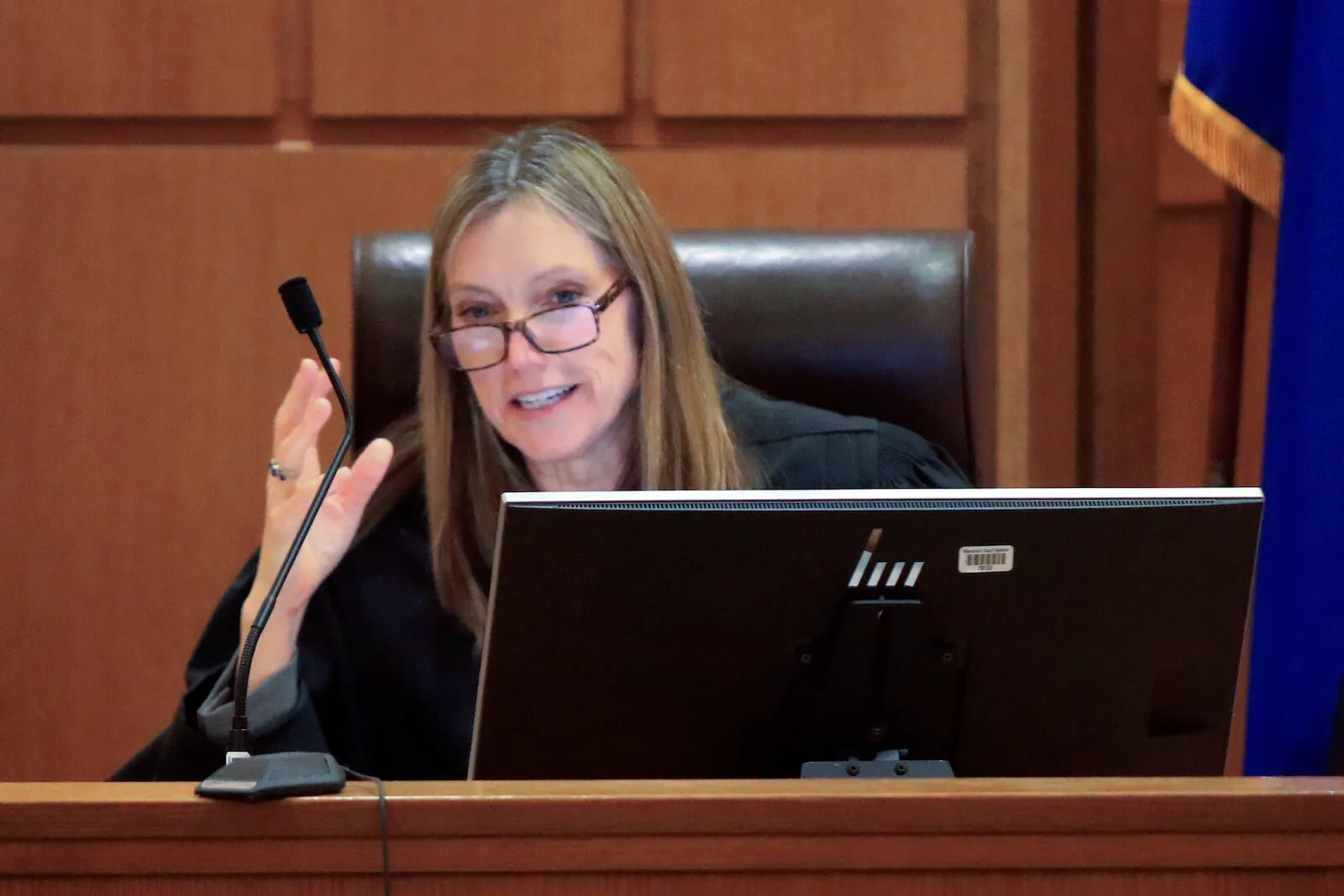
FILE - Dane County Judge Diane Schlipper makes remarks during a case being argued by the State of Wisconsin which challenges an 1849 feticide law at the Dane County Courthouse in Madison on May 4, 2023. (John Hart/Wisconsin State Journal via AP, File)
A Dane County judge’s order indicates the 19th century statue is preempted by state laws written while Roe v. Wade was in effect and that a lawsuit against the state’s 1849 abortion ban may proceed.
Ruling that “there is no such thing as an 1849 abortion ban in Wisconsin,” Dane County Circuit Judge Diane Schlipper rejected a motion Friday to dismiss a lawsuit challenging an 1849 state law prohibiting abortions in virtually all cases. Schlipper’s language appears to telegraph her potential decision when the full case is heard, but the lawsuit is likely to ultimately wind up before the Wisconsin Supreme Court, soon to be controlled by progressives.
When conservative justices on the US Supreme Court last year repealed women’s abortions rights in Dobbs v. Jackson Women’s Health Organization, it left women to navigate a national checkerboard of state-based rights and restrictions.
Earlier: Post-Roe Abortion Bans Have Led to Devastating Outcomes for Women, Study Finds
Wisconsin’s place on that post-Roe v. Wade board is perhaps the most murky because although there were laws written during the time Roe was intact that protected abortion rights up to the point of fetal viability, the 1849 ban was never removed from state statutes. Abortion providers in Wisconsin ceased operation immediately after Dobbs, concerned that district attorneys could charge them with a crime based on the antiquated 19th century language.
State Attorney General Josh Kaul joined three physicians and others in filing a lawsuit last year seeking clarity (“declaratory relief”) over whether they could indeed be prosecuted criminally under the old “pre-Roe” law or if those fears were put to rest by the “post-Roe” statutes.
Schlipper saw no such murkiness.
“A physician who performs a consensual medical abortion commits a crime only ‘after the fetus or unborn child reaches viability,’ Schlipper wrote, citing the “Abortion Prevention and Family Responsibility Act of 1985”— which allows pre-viability abortions and post-viability abortions “if the abortion is necessary to preserve the life or health of the woman, as determined by reasonable medical judgment of the woman’s attending physician.”
Viability refers to the point at which a fetus can survive outside the womb, it is generally considered to be around 23 or 24 weeks.
The 1849 statute, Schlipper said, makes illegal the killing of fetuses by assaulting or battering the mother, but does not apply to consensual abortion.
Schlipper ruled a district attorney would have no authority to prosecute under the 1849 statute and denied a motion by Sheboygan County District Attorney Joel Urmanski to dismiss the lawsuit.
While Schlipper’s ruling is only on the motion to dismiss, her language indicates there is a good chance that Kaul and the doctors will prevail in their lawsuit—setting in motion an appeals process that could take the case to the Wisconsin Supreme Court. And by the time an appeal would get to the court, more than 15 years of conservative control will have ended, as progressive Justice-elect Janet Protasiewicz takes her seat on the court August 1, giving liberals a 4-3 majority.
Protasiewicz repeatedly stated during her campaign this spring that she personally believed abortion should be legal, though she stopped short of saying how she would rule on the specifics of any given case that came before the court.
Reaction to the Ruling
Gov. Tony Evers called the ruling good news and a “critical step in our fight to end our state’s criminal abortion ban and restore the reproductive freedom women had in Wisconsin” before the Dobbs decision.
“We must restore access to safe, legal abortion in Wisconsin,” Evers posted on Twitter.
Other Democrats also celebrated the ruling.
“While we have known from the beginning that this law is unenforceable, this ruling is a key victory in the fight to restore the freedoms we lost in Wisconsin when Roe vs. Wade was overturned a year ago.”
State Rep. Lisa Subeck (D-Madison) said in a statement. “Attorney General Josh Kaul is a champion for reproductive freedom and I am hopeful that we will see more victories in the months ahead.”
In contrast, anti-abortion activists expressed their dismay at the ruling.
WisPolitics reports that Gracie Skogman, the legislative/PAC director of Wisconsin Right to Life, called it “a devastating day in Wisconsin for preborn children.”
Support Our Cause
Thank you for taking the time to read our work. Before you go, we hope you'll consider supporting our values-driven journalism, which has always strived to make clear what's really at stake for Wisconsinites and our future.
Since day one, our goal here at UpNorthNews has always been to empower people across the state with fact-based news and information. We believe that when people are armed with knowledge about what's happening in their local, state, and federal governments—including who is working on their behalf and who is actively trying to block efforts aimed at improving the daily lives of Wisconsin families—they will be inspired to become civically engaged.


New Biden rules deliver automatic cash refunds for canceled flights, ban surprise fees
In the aftermath of a canceled or delayed flight, there’s nothing less appealing than spending hours on the phone waiting to speak with an airline...

One year on the Wienermobile: The life of a Wisconsin hotdogger
20,000+ miles. 16 states. 40+ cities. 12 months. Hotdogger Samantha Benish has been hard at work since graduating from the University of...

Biden makes 4 million more workers eligible for overtime pay
The Biden administration announced a new rule Tuesday to expand overtime pay for around 4 million lower-paid salaried employees nationwide. The...

‘Radical’ Republican proposals threaten bipartisan farm bill, USDA Secretary says
In an appearance before the North American Agricultural Journalists last week, United States Department of Agriculture (USDA) Secretary Tom Vilsack...





